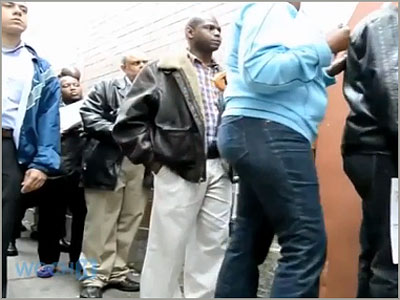Jobs stories this time of year tend to focus on the prospects for the new crop of college grads and interesting seasonal jobs (see my blog post from last week on creative summer services) but one big story might be worth pulling to the front burner in light of this week’s monthly update on the nation’s jobless rate: The plight of the long-term unemployed.
As a bill to extend emergency unemployment benefits fizzled last week in Congress, attention briefly turned to the millions of Americans sidelined seemingly permanently from working. According to most recent figures from the federal Bureau of Labor Statistics (which will be updated Friday when the latest Employment Situation report (PDF) is posted), about 3.5 million people were unemployed for more than 27 weeks as of April; that’s down from a year ago (arguably because people have given up, not because they have found jobs) but still a whopping 36 percent of all unemployed persons.
Here’s a recent entry in the Five Thirty Eight blog detailing how the long-term unemployed fare worse in job searches than those who were recently put out of work, among other statistics. The human-interest anecdote in the post also is a reminder that every month, a new cohort of would-be workers still is heading into precarious straits as they max out of unemployment benefits. Why not find some of your area’s long-term unemployed who are competing with new college graduates and with people whose resumes show no big gaps? Their individual stories are a compelling snapshot, a reflection of the region’s economy and a way to showcase any local programs (public, private, corporate) available to help those whose careers have derailed.

Here’s a recent LA Times report, based on a Brookings Institute paper, about how low the odds are for the long-term unemployed to find new position. And here’s a recent Washington Post take with a couple of interesting angles; note the point that a Northeastern University researcher sent out fictitious resumes representing various scenarios and found that employers were more receptive to applicants with less experience but also no big job gaps. That’s sobering and definitely the basis for questions to local HR managers, small- and medium-business owners and other hiring managers.
The Economic Policy Institute posts that “Long-term unemployment exceeds pre Great Recession levels in virtually every state,” and includes a helpful interactive map that will help you put your state’s LT jobless levels into national context. And the Urban Institute last year published a look at the demographic characteristics of long-term jobless, note the breakdown by industry/occupation which can help you narrow down to your own beat if desired.
This Denver Post piece, “Long-term unemployed stuck circling and running out of fuel,” is a good start in localizing the issue; I’d be tempted to to include a few more case studies for human interest – perhaps finding people that correspond to the most-likely scenarios in the Urban Institute’s report.
In addition to house-hold level stories and pressing employers about their receptiveness to hiring LT jobless people, you might want to look at the ripple effect throughout your area’s economy. From sellers of big-ticket goods like furniture, RVs and appliances to landlords, banks and service providers, who loses out when the number of breadwinners in a community slumps? When families combine households (I’ve got a couple of homes in my neighborhood with three generations – 20-something, 50-something and 80-something – under one roof) how does that affect consumption and the spread of dollars through a community?










